School Life
Revision
Lesson 8 School Life
1. Listen and read the dialogue. Act it out in pairs.
Buggy: What lessons did you have today, Jane?
Jane: I had mathematics and two English lessons.
Buggy: What did you do in your maths lesson?
Jane: Well, we did many things. We divided, subtracted, multiplied and added different numbers.
Buggy: Can you multiply well?
Jane: I think I can. Why?
Buggy: Then say what is fifteen multiplied by twelve.
Jane: Let me guess. It is one hundred and eighty.
Buggy: Great. And what did you do in your English lessons?
Jane: We spoke English, read English texts, wrote some sentences on the blackboard and listened to the CD player. Those were very interesting lessons.
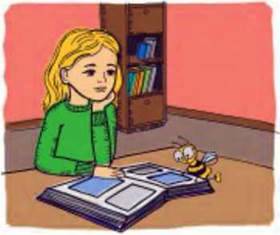
2. Look at the pictures and correct the mistakes. There is a model to help you.
Model: The pupils are not listening to the CD player now. They are reading
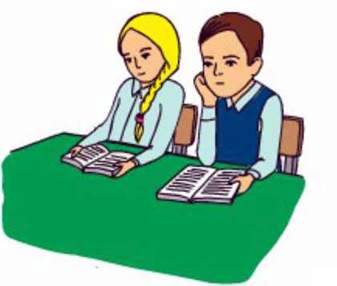
The pupils are listening to the CD player.
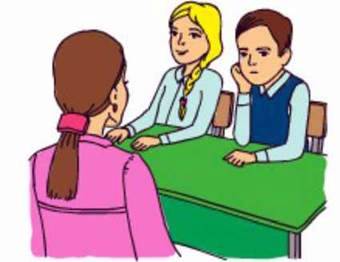
The teacher is writing new words on the blackboard.
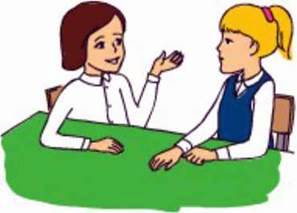
The girls are singing.
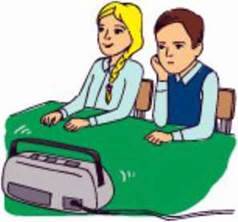
The pupils are repeating the words after their teacher.
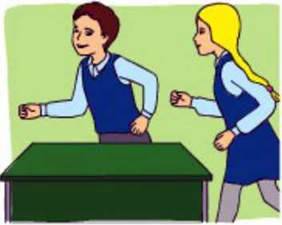
The pupils are writing their test now.
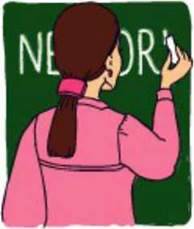
The teacher is explaining a new grammar rule.
3. Listen and read the dialogue. Act it out in pairs.
Mother:Susan, how’s your English at school?
Susan: Not bad, Mum. I have got excellent marks for my home assignment. Mother: I am very glad to hear that. Tell me, please, what did you do in your English lesson yesterday?
Susan: Well, we checked our home assignment, then we learnt and memorised new words. After that we read a new text and answered the questions. Then the teacher wrote the English sentences
Mother: And what’s your home assignment for the next lesson?
Susan: Oh, I can’t remember. I’m going to call Jack and ask him.
Mother: Susan?!
4. Listen and read the text. Then answer the questions.
A COMPUTER
Life in the world changed greatly when the first computer appeared. Now computers can do much work and make our lives easier.
You can work or play on your computer. If you want to watch a film you don’t have to switch on your TV set or your video recorder. You can watch it on your computer. If you want to read a book, you don’t have to buy that book. You may have it in the digital form and read it on the screen of your computer monitor. If you want to write something you don’t need a pen or a pencil. You can type the words on your computer and then print them out.
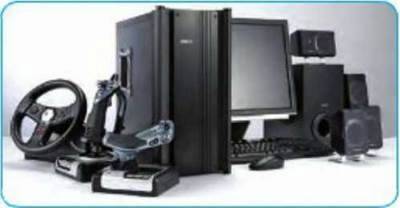
If you want to send a message to your relatives or friends who live in another town (village) or even country you don’t have to go to the post office. You can use your e-mail and send the message from your computer (but you must have the access to the Internet).
If you want to play you don’t have to buy toys. You can play with the toys on your computer.
A computer substituted many things in our life. And the life is now easier and more interesting.
1. Does a computer make our life more difficult or easier?
2. What things can a computer substitute in our everyday life?
3. Do you need a TV set if you have a computer and want to watch a film?
4. In what form must a book be if you want to read it by means of your computer?
5. What must you have to send a message to your friend or relative who lives far from you?
5. Match the problem column, the suggestion column and the answer column to make up small dialogues. There is a model to help you.
Model: A: I’m late for school.
B: Why don’t you go by bus?
A: No, I can run.
Problem | Suggestion | Answer |
I am ill. | How about a sandwich? | No, I’d rather talk to my friend. |
I am tired. | Why don’t you go by bus? | No, I’d rather take some medicine. |
I have much free time today. | Let’s have some rest. | No, I can run. |
I am hungry. | Why don’t you go to consult a doctor? | No, I’d rather go to the cinema. |
I am late for school. | Let’s watch cartoons on TV. | No, I am on a diet. |
6. Tell about your lessons at school.